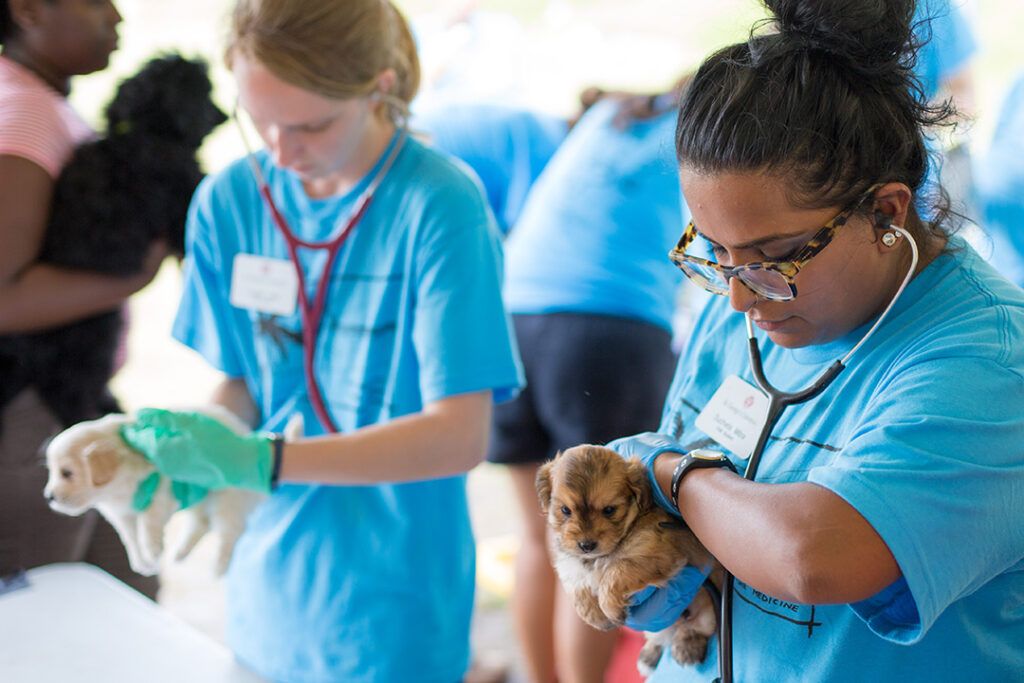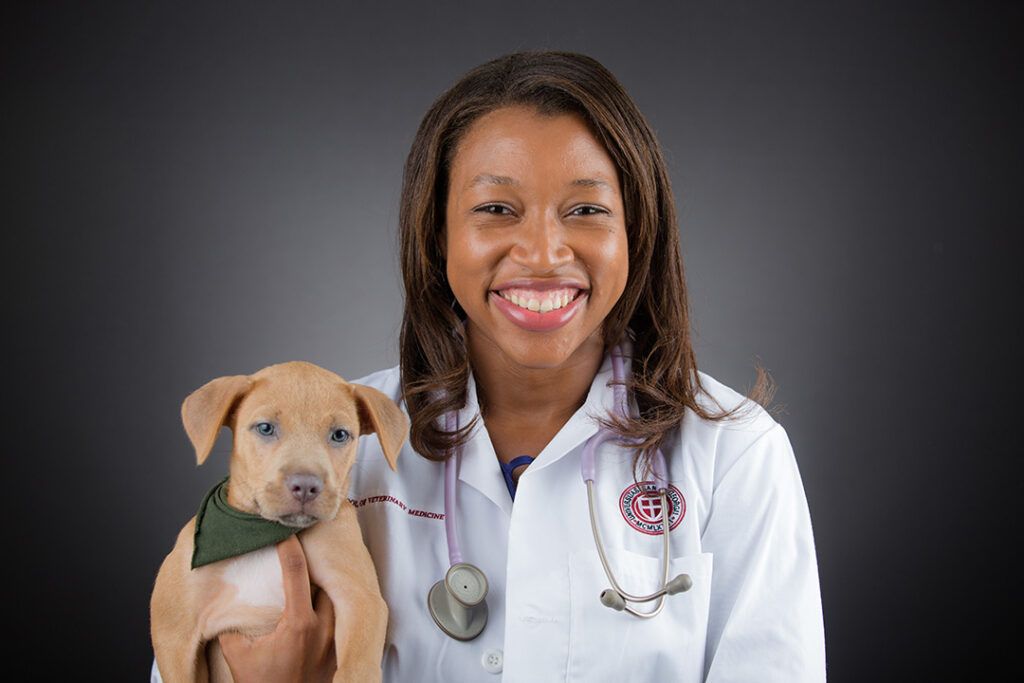Sharing your information gives you direct access to a dedicated enrollment counselor and tailored materials based on your specific interests.
Admissions
Where you choose to go to veterinary school can make a difference.
Begin Your Journey to Becoming a Licensed Veterinarian
Whether your goal is to be a neighborhood veterinarian, a specialist working in a hospital, or contribute to animal health research, St. George’s University School of Veterinary Medicine can help you achieve your career goals.
We invite you to discover if SGU is the right fit for you. Explore our curriculum, learn about our requirements, and start the application process.
A Strong Foundation
SGU’s systems-based curriculum is designed to equip aspiring veterinarians with the integrated comprehensive knowledge, clinical, and professional skills that are necessary for success in modern veterinary practice.
Personalized Support
SGU supports every veterinary student with personalized learning strategies, caring faculty and advisors, and small group learning resources designed to promote success in vet school and beyond.
Advancing Animal Health Care with Research
SGU’s dual-degree programs help veterinary students merge animal health care with original research, supporting career paths in advanced practice, academia, or veterinary medical innovation
A Network of Peers Around the World
While most students come from the US, SGU’s diverse community brings together global perspectives and varied backgrounds offering a truly international experience in veterinary education.
Veterinary Medical School DVM Program Requirements
4-year DVM Program Requirements for US and Canadian Applicants
Degree
Applicants should possess a bachelor’s degree from an accredited university. Under exceptional circumstances, a candidate may be considered with a minimum of 60 undergraduate credit hours.
Prerequisite Coursework
The following specific undergraduate coursework (or its equivalent*) is required as part of the program requirements for admission. Students should apply with 70% of their prerequisite courses completed. Survey courses are not accepted.
- One year General Biology or Zoology with lab
- One year General Chemistry with lab
- One semester Organic Chemistry with lab
- One semester Genetics
- One semester Biochemistry
- One semester Physics with lab
- One semester Math (Calculus, Computer Science, or Statistics)
- One semester English
For students applying from institutions that operate on a quarterly system, it is essential to verify that they satisfy the minimum semester credit requirements. To convert quarter units to semester hours, simply divide the quarter units by 1.5. For instance, 5 quarter units of Biochemistry would be equivalent to 3.3 semester hours.
*If a course is not explicitly listed as a prerequisite, please ensure that you verify any prerequisite equivalencies by submitting the Prerequisite Substitution Request Form. This step is essential to obtain approval. Remember that all courses must be completed at an accredited institution.
Minimum Course Requirements
To be eligible for admission, applicants must meet the following criteria:
- Prerequisite Coursework Completion:
- Successfully complete all prerequisite coursework with a Pass or Satisfactory grade equal to a C- or higher.
- Ensure that all prerequisite coursework has been completed within ten (10) years of the intended matriculation date.
- In-Person Completion Requirement:
- At least 60% of the prerequisite coursework, including all labs, should be completed in-person*
*Exceptions will be considered for the period between the Spring 2020 and Fall 2021 semesters and will need to be approved by the Faculty Student Selection Committee (FSSC) upon submission of an application if the course includes a lab.
Veterinary Experience
The Faculty Student Selection Committee (FSSC) does not stipulate a minimum number of hours of animal experience. We seek students who are passionate about the study and have undertaken efforts to get a feeling for the essence of the veterinary profession. We encourage applicants to have garnered experience working with companion animals as well as large animals. Work with other animals like exotics and lab animals, as well as research and regulatory experience, will be considered as additional strong points in the application.
4-year DVM Program Requirements for Non-us and Canadian Applicants
Degree
Applicants should possess a bachelor’s degree from an accredited university. Under exceptional circumstances, a candidate may be considered with a minimum of 60 undergraduate credit hours.
English Proficiency
English language: An English exam is required for any prospective student whose country is not considered English-speaking as per UKVI.
If you obtained your undergraduate degree in any English-speaking country, there may be an exception. In this instance, you must request a waiver in order to be determined by our Faculty Student Selection Committee.
- International English Language Testing System (IELTS)- 7.0 on each band
- Test of English as a Foreign Language (TOEFL)- 100 Overall
| Program | Qualifications | Entry Point |
| 5-Year DVM Program | Advanced Levels: Minimum 3 subjects with A’s and B’s in Biology, Chemistry, and either Math or Physics; Math or Physics can be accepted at AS level with strong non-science third A level. Approved foundation programs: SGU recognizes and approves a range of science/medical pathway programs. Full IB Diploma: Requires a minimum score of 32 points; 3 HL science subjects recommended; minimum of 2 HL subjects required, which must include Chemistry and Biology; results 5 or higher. India 10+2 or CBSE: Minimum of 80% average with no grade below 80% in Biology, Chemistry, Math, Physics, and English. |
Preveterinary Year 3 |
| 6-Year DVM Program | Secondary school diploma: Exceptional science performance with AP’s, SABIS High School. Further education: AS Levels, Baccalaureate, South Africa Matric, Higher School Exam, Irish Leaving Certificate. WASSCE: B2 or better in minimum 6 subjects which include Biology, Chemistry, Math, Physics, and English |
Preveterinary Year 2 |
| 7-Year DVM Program | IGCSE: Strong Science Performance B or better in minimum 6 subjects, which include Biology, Chemistry, Math, Physics, and English; Scores Vary by Region | Preveterinary Year 1 |
Technical Standards
St. George’s University School of Veterinary Medicine has established technical standards for admission to, continued enrollment in and graduation from the DVM program. You may review the technical standards here.
St. George’s University is committed to and embraces diversity in all forms. Students with disabilities are encouraged to access all campus resources including registering with Student Accessibility and Accommodation Services. Early communication is critical to successfully considering accommodation requests and arranging reasonable accommodations.
Observation Skills
Applicants/Veterinary Medical students must be able to participate actively in all demonstrations and laboratory exercises in the DVM professional curriculum, and to assess and comprehend the condition of all patients assigned to them for examination, diagnosis, and treatment.
Communication Skills
Applicants / Veterinary Medical students, must be able to communicate effectively and sensitively, with clients and owners of animals, in order to elicit information, assess verbal and non-verbal communications, and be able to effectively and efficiently transmit information to these clients and owners of animals, fellow students, faculty, staff, and all members of the veterinary health care team. Communication skills include speaking, reading, and writing, as well as the observation skills described above.
Motor Skills
Applicants/Veterinary Medical students must have sufficient motor function to collect and derive information from animal patients by palpation, auscultation, and other diagnostic maneuvers, be able to perform basic laboratory tests, carry out diagnostic procedures, and be able to execute the contact with animal patients reasonably required to provide general care and emergency treatments.
Intellectual/Conceptual, Integrative, and Quantitative Abilities
Applicants/Veterinary Medical students must be able to measure, calculate, reason, analyze, and synthesize. Problem-solving, the critical skill demanded of veterinarians, requires all of these intellectual abilities. In addition, Applicants/Veterinary Medical students must be able to comprehend three-dimensional relationships and to understand the spatial relationships of structures. Applicants/Veterinary Medical students must have the capacity to perform these problem-solving skills in a timely fashion.
Behavioral and Social Attributes
Applicants/Veterinary Medical students must possess the emotional health required for full utilization of their intellectual abilities, the exercise of good judgment, the prompt completion of all responsibilities attendant to the diagnosis and care of animal patients, and the development of mature, sensitive, and effective relationships with clients and owners of animals and others. Applicants/Veterinary Medical students must also be able to tolerate taxing workloads, function effectively under stress, adapt to changing environments, display flexibility, and learn to function in the face of uncertainties inherent in the clinical problems of many animal patients. Compassion, integrity, concern for others, commitment, and motivation are personal qualities which all applicants/veterinary medical students should possess.
Animal Handling and Husbandry; Veterinary Medicine and Surgery
Applicants/Veterinary Medical students must be capable of recognizing the temperament of domestic and non-domestic animal patients and of making decisions related to the handling, restraint, and safety of the animal as well as the safety of clients and animal owners, the veterinary medical team, and people in the immediate area. It will be necessary for veterinary students to safely and humanely make physical contact with animal patients of the domestic species for diagnostic and treatment purposes.
Transfer Applications
St. George’s University School of Veterinary Medicine admits students to begin in the first year of our four-year program. In rare circumstances, we may review transfer applications from students who have completed less than or equal to two years of study. Transfer opportunities are not guaranteed and considered on a case-by-case basis. Admitted transfer students may be required to repeat one or two terms in order to align their previous coursework with the SGUSVM curriculum. Initial review of all transfer student applications is performed by the Office of Admissions, and if all eligibility requirements are met, the application will be sent to the Chair of the FSSC, who will review the application in conjunction with the Associate/Assistant Dean of Academics to make a final determination.
Eligibility requirements for transfer consideration include:
- Have successfully completed at least one year (two semesters) of the veterinary curriculum at an AVMA-accredited veterinary school.
- Be in good academic standing, without any academic warnings, probation, or dismissal records.
Prospective transfer applicants should send an email to: vetadmission@sgu.edu for further information.
The Application Process
Choose how you want to apply for SGU School of Veterinary Medicine with ease.
Choose how you want to apply for SGU School of Veterinary Medicine with ease. Prospective students can apply to the veterinary school for the January or August term through either the Veterinary Medical College Application Service (VMCAS) or the SGU direct application.
Our Dedicated Admissions Team Is With You From Application Start to The First Day Of Classes.
SGU provides each applicant with personalized attention and support throughout the application process. As soon as you start your application, you are assigned a dedicated Admissions Officer and Admissions Coordinator who will work with you to ensure that all your questions are answered and that your application file is completed and reviewed quickly.

Multiple application paths to your dream career.
Applying to SGU is easy with multiple options to apply to SGU School of Veterinary Medicine. Before you get started, take a minute to review the requirements for the DVM program here.
Step 1 : Submit Your Application
Choose how you want to apply for SGU School of Veterinary Medicine with ease. Prospective students can apply to the veterinary school for the January or August term through either the Veterinary Medical College Application Service (VMCAS) or the SGU direct application.
SGU offers a variety of options to apply to SGU School of Veterinary Medicine. You can apply directly to SGU by completing the application and submitting it to the Office of Admission at vetadmission@sgu.edu. Alternatively, you can apply through the Veterinary Medical College Application Service (VMCAS).
Step 2: Submit Your Supporting Documents
When applying through VMCAS, ensure that all supporting documents are sent directly to VMCAS. No supplemental application or fee is required. However, if you are applying directly to SGU, the following documentation is required to complete your application:
- Official transcript(s) from each College/University and/or professional school that you have attended
- Two Letters of Recommendation or 1 Health Committee Letter of Recommendation. One letter of recommendation from a veterinarian is recommended, but not required.
The Admissions Process
The admission process is comprised of three stages: Initial Review, Interview and Final Review. Your Admission Officer will keep you updated about your progress and answer any questions you may have.
Initial Review
After submitting your application and receiving your supporting documents, our admissions committee will conduct a holistic evaluation. This assessment considers your academic achievements, animal experience, and other relevant attributes. Following the initial review, you will either receive an invitation for a veterinary medical school interview or you will be notified that you have not been selected for an interview. Typically, applicants receive their interview decision within two weeks of submitting their application. Occasionally, the committee may request additional information before finalizing the interview decision. Your Admissions Officer will promptly inform you if any further details are needed.
The Interview
The interview is your chance to showcase how your journey has uniquely prepared you for success as a veterinary medical student and for a lifelong commitment to excellence in the field of veterinary medicine. During dialogues with our alumni interview team, you’ll delve into the valuable lessons you’ve learned from overcoming challenges and emphasize the experiences that will shape you into a compassionate, dedicated, and exceptional veterinarian. Interviewing with an SGU alumnus also offers you insights into the program and allows the admissions committee to better understand your personality, interests, and aspirations.
As part of our commitment to supporting students throughout the process, we encourage you to review the following information to prepare for and make the most of your interview experience.
How to Prepare for your Veterinary Medical School Interview
As you prepare for your veterinary medical school interview, consider our student selection criteria and reflect on how your academic background, interests, and experiences align with these attributes.
Be prepared to discuss your motivation for pursuing a career in veterinary medicine, as well as ethical considerations within the profession.
Share insights gained from overcoming academic challenges and the strategies you’ve developed for success.
Ensure that you set aside a quiet space and test your device for camera and sound quality. This will help you feel confident in starting your interview on time and ready to engage in conversation with the interviewer.
Bring your best self to the discussion by dressing professionally, sharing your strengths, and demonstrating an openness to learn from the veterinary medical school experience and interaction with faculty, peers, and patients.
Final Review and Admission Decision
After your interview, the Admissions Officers will forward a summary of your interview and your application file to our Faculty Student Selection Committee. This committee will conduct a holistic review of your complete file and make the admission decision. The possible admissions decisions are:
- Admit
- Admit with Provisions (Note: If you are admitted with provisions, your admissions letter will outline the specific conditions of your offer.)
- Not Admit.
Desirable Attributes For Student Applicants
Our committee on admission, The Faculty Student Selection Committee (FSSC), is responsible for the selection of students to St. George’s University School of Veterinary Medicine (SGUSVM).
Applicants to SGUSVM are selected individually for admission by considering each applicant’s academic strengths as well as their experiences and attributes. These factors are viewed in combination to consider how an individual might contribute value not only as a veterinary medical student, but also as a future veterinarian.

The successful applicant to SGU SVM will have demonstrated the following strengths and attributes:
- Strong academic achievement or potential
- Empathy and compassion
- Motivation towards and demonstrated interest in the profession of medicine
- Ability to learn from mistakes or failures
- Critical thinking with problem-solving ability
- Strong communication skills and ability to work in a team
- Resilience and adaptability
- Sense of community responsibility
- Curiosity and dedication to lifelong learning
- Sensitivity and openness to diversity
Get in Touch
Contact admissions with your specific questions
Thank you for your interest in St. George’s University. We look forward to speaking with you and answering any questions you may have. Please fill out the form for the school of your choice, and a current student or St. George’s University representative will follow up with you.

